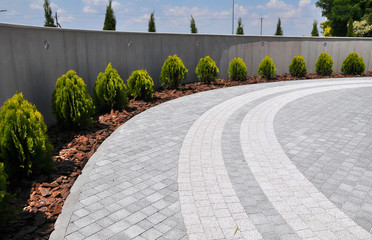Driveway Paving Charleston SC is a great choice when you want to transform your driveway into a stunning, aesthetically pleasing area. There are many types of driveway paving, and there are several ways to ensure the project will go as smoothly as possible. Here are some tips for your next driveway paving project. Listed below are the main steps involved in this project. Read on to learn more. And don’t forget to visit our website for helpful tips and advice.

Driveway installation costs vary by square footage. The cost per square foot depends on the material used and the installation process. A standard rectangular driveway will cost less than an extensive circular driveway, but more to pave. In addition, if you need major changes to the landscape, such as grading, excavation, and drainage systems, they will add to the cost. When determining your total driveway paving cost, consider the materials used, as a thicker driveway means more labor and materials. Most driveways are only three to four inches thick, which should be sufficient.
Once you have chosen the materials, you need to wait a few days for them to dry completely. Generally, this means waiting for several days after a rainstorm. This will ensure that the concrete will cure fully before the next rainstorm. If the weather is not good for driveway paving, you should try to schedule a project during a dry period. Otherwise, you may end up with a flooded driveway, which will be a pain in the rear.
When it comes to material, paving stones and concrete pavers are the most popular choices. However, they are expensive and can easily become outdated after a few years. Moreover, paver patterns can be disrupted by tree roots, which can damage the driveway. In rural areas, traditional gravel or crushed granite is the best option because they require very little maintenance, other than occasional weeding. As for the environmental benefits, both gravel and decomposed granite are environmentally friendly, and the installation is faster.
When it comes to the type of material, asphalt and concrete take 48 to 72 hours to cure. However, concrete can take seven to 10 days. Meanwhile, gravel and paver driveways can be used immediately after installation. A concrete driveway may take up to 7 days to fully cure. This is another reason why homeowners should carefully consider their weather before paving a driveway. If the weather in your area can change rapidly, you should make sure the materials are properly prepared.
When deciding on a driveway paving company, it’s important to find one that has several years of experience and references from previous customers. Also, be sure that they’re bonded, insured, and have been in business for at least five years. Make sure the driveway paving company you choose has a written contract and provides you with a detailed breakdown of costs. And don’t forget to ask about payment schedules, and check the contractor’s business license.
When it comes to deciding on a driveway paving material, brick is not the right choice. Its price range varies from $1,600 to $21,600 and depends on a variety of factors. The material used, the shape of the driveway, slope, and location all influence the final price of your project. A brick driveway typically costs between $10 and $30 per square foot. However, it can take several decades to completely resurface an entire driveway.
Asphalt has its downsides. It absorbs heat, so if you live in a warmer climate, avoid touching the surface. It is also limited in creativity. However, manufacturers are constantly working to create different ways to color asphalt and seal it. Fortunately, a quality contractor can transform your driveway into a beautiful, functional space. So, don’t delay hiring a driveway paving company! If you are ready to get started, read on to learn more about driveway paving!
While asphalt and gravel are both durable materials, pavers age better and require less maintenance. For example, asphalt requires a seal coat six months after installation. Eventually, the cracks in an asphalt driveway can progress into a pothole. On the other hand, pavers are made of a higher-grade material and are more durable. In addition, the material can easily be replaced should it start to crack. That means that you’ll have to buy new pavers once in a while.